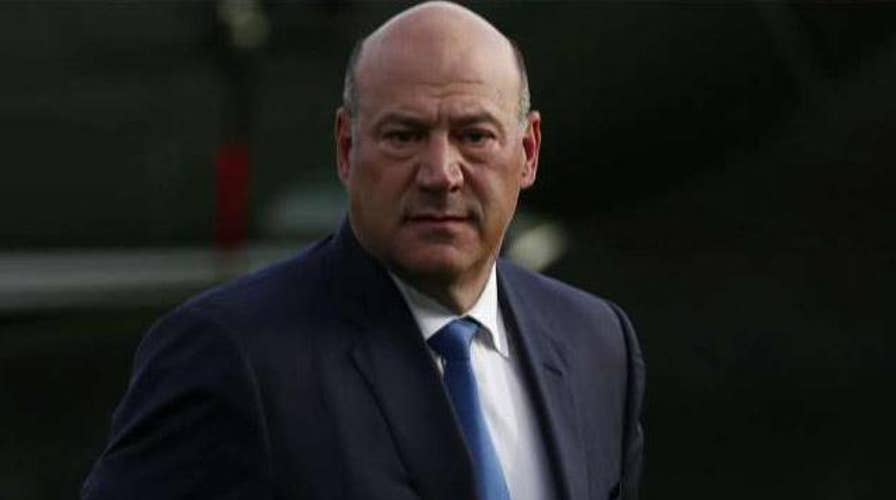Gary Cohn to resign as Trump's top economic adviser
President Trump thanks Cohn for his service to the American people.
It doesn't come as a complete shock that Gary Cohn, President Trump's top economic adviser, is resigning from his post. After all, the former investment banker has been one of the strongest opponents of Trump's plan to place tariffs on steel and aluminum imports.
However, White House officials told The New York Times Tuesday there was "no single factor" behind Cohn's sudden exit. The announcement of his departure comes just six days after Hope Hicks announced she would be leaving her role as White House communications director to explore new opportunities.
“Gary has been my chief economic advisor and did a superb job in driving our agenda, helping to deliver historic tax cuts and reforms and unleashing the American economy once again," President Trump said in a statement. "He is a rare talent, and I thank him for his dedicated service to the American people.”
White House Chief of Staff John Kelly credited Cohn with helping grow the economy and passing a historic tax reform.
"I will miss having him as a partner in the White House, but he departs having made a real impact in the lives of the American people," Kelly added in a statement.
Cohn thanked Trump and his colleagues, adding that he is "grateful" to the president for the opportunity to serve his country and enact pro-growth economic policies.
Here's what you need to know about Cohn as he prepares to leave the White House in the coming weeks.
Growing up
Born and raised in Cleveland, Ohio, Cohn didn't have the easiest childhood. He was dyslexic and had trouble in school.
“[It was your] typical Midwestern upbringing. Had dyslexia. It was the early to mid-'60s. Dyslexia wasn’t as well-known or understood as it is today. So clearly went through the formative part of my youth suffering with dyslexia," Cohn told Jake Siewert, head of corporate communications for Goldman Sachs, during a December 2016 podcast.
Feeling misunderstood, Cohn said he "bounced around from school to school" until he found his home at Gilmour Academy, a Catholic, co-ed boarding school in Gates Mills, Ohio.
“A couple of the brothers, Brother Lavelle and Brother Carl, really took an interest into me," he explained. "Not because I was the best student in the class...because I might have been the hardest-working kid in the class."
With help from his instructors and a lot of hard work, Cohn graduated high school and looked forward to his future at American University in Washington, D.C., where he graduated with a business degree in 1982.
Cohn didn't have a job waiting for him after graduation, so he did what most college kids do and moved back into his parents' home, according to a speech he gave at his alma mater.
His first official gig outside of college was at U.S. Steel in Okron, Ohio, to appease his father. Enchanted by the idea of Wall Street, Cohn eventually pivoted within a few months to investment banking, landing a role of a lifetime at Goldman Sachs.
Pre-White House
Cohn was president and COO at Goldman Sachs -- second-in-command -- before he left the company after nearly 30 years to join Trump's team.
He was recruited by the bank in 1990. Within his first four years on the job, he made partner, according to Business Insider.
"That first year as partner, you know, I got to the point where I was trying to be a trader and trying to be a manager and trying to manage the business," Cohn told the online news outlet.
But Cohn reportedly "grew tired of waiting" for Lloyd Blankfein, Goldman’s chairman and C.E.O., to leave his position, so he jumped at the opportunity to join Trump's team in December 2016, Vanity Fair reported in an August 2017 profile of Cohn.
Steven Mnuchin, the U.S. Secretary of the Treasury, and Steve Bannon, Trump's former chief strategist and senior counselor, also worked at Goldman Sachs.
Cohn's role: From Goldman to the White House
The 57-year-old businessman was a surprise pick for Trump, who vilified Goldman on the campaign trail. But he quickly changed his tone after winning the election, choosing several bank alumni to fill senior roles on his staff.
It was also a big risk for Cohn, who was making $21 million a year as president and COO at Goldman Sachs. But it was a risk he was willing to take.
"Becoming the director of the National Economic Council gave Cohn a graceful exit from Goldman and allowed him to follow in the footsteps of two illustrious Goldman senior partners: Robert Rubin and Stephen Friedman. (Leaving also allowed Cohn the not insignificant economic benefit of being able to convert his roughly $250 million of Goldman Sachs stock into Treasury securities on a tax-deferred basis)," Vanity Fair reported in 2017.
Cohn touted the success of his "pro-growth economic policies" while serving in Trump's White House.
His policy portfolio included tax and retirement, infrastructure, the financial system, energy and environment, healthcare, agriculture, global economics, international trade and development, and technology, telecommunications and cybersecurity.
Cohn also helped advance the president’s deregulatory agenda, and organized his participation in the World Economic Forum in January 2018.
However, Cohn recently broke with Trump on trade policy.
He's been the leading internal opponent to Trump's planned tariffs on imports of steel and aluminum, trying to orchestrate an eleventh-hour effort to push Trump to reverse course.
Trump has been resistant to those efforts, and reiterated Tuesday he will be imposing the tariffs in the coming days.
Fox News' John Roberts and The Associated Press contributed to this report.





